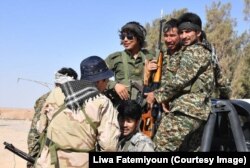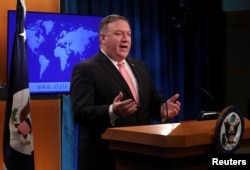The U.S. Treasury Department added two Iran-backed militant groups to its official list of terrorists on Thursday.
The Fatemiyoun Division, composed of Afghan nationals, and the Zaynabiyoun Brigade, consisting of Pakistani nationals, have been fighting alongside the forces of Syrian president Bashar al-Assad against the opposition and Sunni militants in the country.
The groups' members — mostly refugees and migrants residing in Iran — have been recruited by Iran's Islamic Revolutionary Guard Corps-Qods Force (IRGC-QF).
"The brutal Iranian regime exploits refugee communities in Iran, deprives them of access to basic services such as education, and uses them as human shields for the Syrian conflict," U.S. Treasury Secretary Steven Mnuchin said in a statement.
"Treasury's targeting of Iran-backed militias and other foreign proxies is part of our ongoing pressure campaign to shut down the illicit networks the regime uses to export terrorism and unrest across the globe," the statement added.
The Fatemiyoun Division, numbering between 10,000 and 20,000 fighters, first entered the Syrian civil war to guard the shrine of Sayyida Zainab bint Ali, the granddaughter of Prophet Muhammad, in the Syrian capital of Damascus as a part of IRGC's goal to protect holy Shi'ite sites.
The group later joined the war on Assad's side in multiple front lines of Daraa, Aleppo and Deir el-Zour. It is unclear how many of its fighters died in the brutal war, but Iranian officials last year estimated some 2,000 deaths among the group.
Zaynabiyoun Brigade
The Zaynabiyoun Brigade also entered the Syrian conflict with the pretext of defending the Sayyida Zainab bint Ali shrine. It is unclear how many fighters have joined the group, but local experts say the group includes hundreds of Pakistani Shi'ites based in Iran, as well as Afghan Shi'ites who went to Iran from Pakistan.
Rights groups say many Afghan and Pakistani refugees in Iran "volunteer" to join Iran's side in Syria in the hopes of gaining legal status for their families. Human Rights Watch has reported that many of the fighters are underage, with some Afghan children as young as 14 fighting in the Fatemiyoun Division.
The United Nations' International Organization for Migration (IOM) last September announced 1 million Afghan refugees were registered in Iran and another 1.5 to 2 million were "undocumented."
Cannon fodder
In a tweet following Thursday's sanctions, U.S. State of Secretary Mike Pompeo accused Iran of "preying" on refugees and using them as "cannon fodder" in Syria.
"Maximum pressure continues," Pompeo vowed.
The U.S. government has reimposed a series of sanctions against the Iranian regime and its allies in the Middle East since last May, when U.S. President Donald Trump withdrew from the 2015 Iran nuclear deal in which Iran agreed to curtail its nuclear program in exchange for international sanctions relief.
Iranian airline
The designation Thursday also added Iranian cargo airline Qeshm Fars Air, and Armenia-based Flight Travel LLC to the list of sanctioned organizations. The Treasury Department said both aviation entities were tied to the sanctioned Mahan Air, which has ties to IRGC-QF.
"Since the onset of the Syrian civil war, Iran has routinely relied upon Iranian airlines such as Mahan Air to fly fighters and materiel to Syria to prop up the Assad regime," the Thursday statement said.
"Mahan Air has transported IRGC-QF operatives, weapons, equipment, and funds abroad in support of the IRGC-QF's destabilizing regional operations. Mahan Air has also transported IRGC-QF Cmdr. Qassem Soleimani, who is sanctioned under United Nations Security Council Resolution 2231 and therefore covered by a travel ban," the statement added.
According to IOM, the U.S. sanctions have accelerated the return of thousands of Afghans from Iran due to reduced economic opportunities and fueled inflation in the country.
Laurence Hart, the U.N. agency's chief of mission in Afghanistan, told Agence France-Presse earlier this month that nearly 800,000 Afghans returned home from Iran in 2018, and the trend is expected to continue in 2019.






